ACORN: Alive and Kickin’!
By Wade Rathke
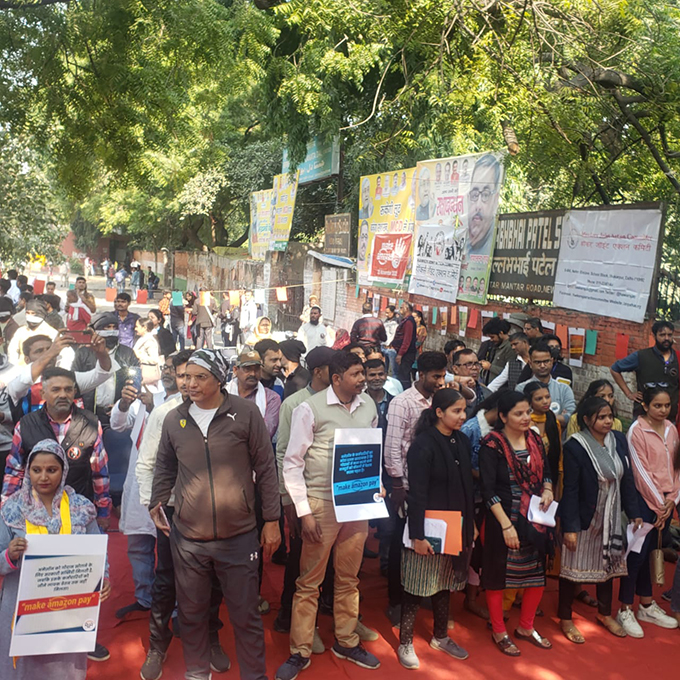
ACORN is the Association of Community Organizations for Reform Now, founded in June 1970, more than fifty years ago. Throughout its history ACORN has been a multi-issued, direct action, membership organization of low-and-moderate income families and lower-waged workers organized in their communities, housing blocks, and workplaces, both formal and informal. Originally begun as pilot project, and an affiliate of the National Welfare Rights Organization (NWRO) in Little Rock, Arkansas, the organization, ACORN International, is a federation of affiliates in more than fifteen countries with over 250,000 members.
If you’re surprised at the news of ACORN’s continued vigor and vitality, you may be an American, middle-aged or older, who knew ACORN as the half-million-member community organization and powerhouse winning bank agreements that facilitated homeownership for millions, living wage agreements covering tens of millions in more than 100 cities and states, registering more than one-million new voters each cycle, and winning countless victories at the local level in thirty-four US states, more than 100 cities, and countless neighborhoods. If you’re a millennial American, you may have a vague memory that ACORN was something big “back when” and was caught in some video firestorm, though the details were fuzzy. If you’re a Gen Z American, you may have read something about ACORN in a political science, sociology, or urban affairs course if you were college-bound, but, basically, you’re clueless.
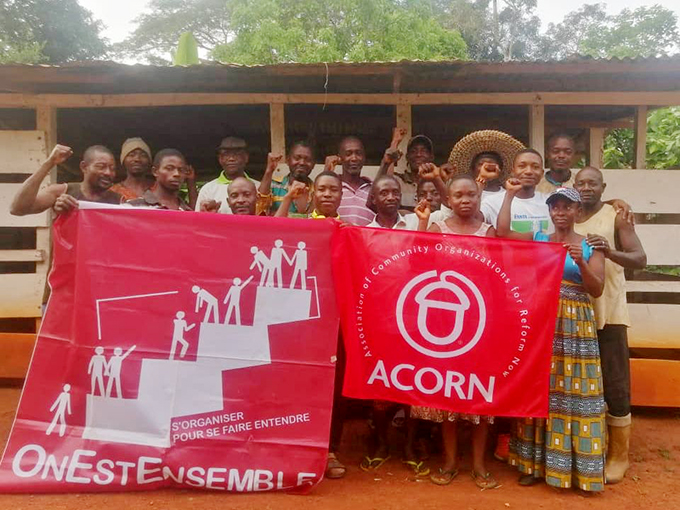
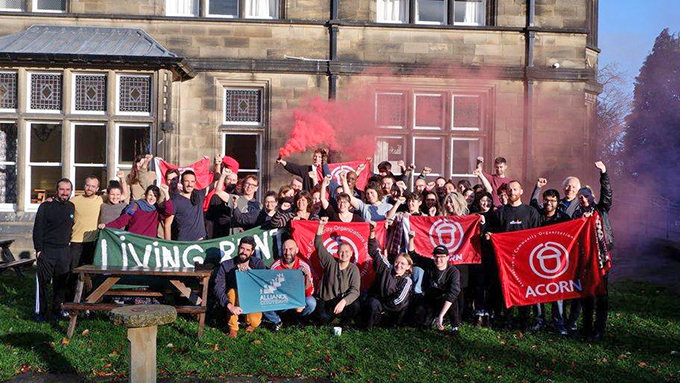
But, if you are a tenant anywhere in England, Ireland, Scotland, or Wales, you know ACORN as your union in the community fighting to cap rents, improve conditions, win security of tenure, and put the brakes on letting agencies. If you live in Grenoble, Lyon, or the Paris suburbs, you not only know ACORN as your community organization, but if you are also a Muslim woman you know ACORN as your civil rights union that won access to you to participate in sports teams wearing a hijab and to swim with your children in public pools. If you live in Canada for the last two decades, you know ACORN at the community level from coast to coast in the dozens of cities where ACORN works and the six offices there where not only has it won community and tenant issues, but where it has fought payday lending, won internet access in national agreements, targeted housing financialization, blocked gentrification and “demovictions”, pioneered living wage victories, and more. If you live in Mumbai’s Dharivi
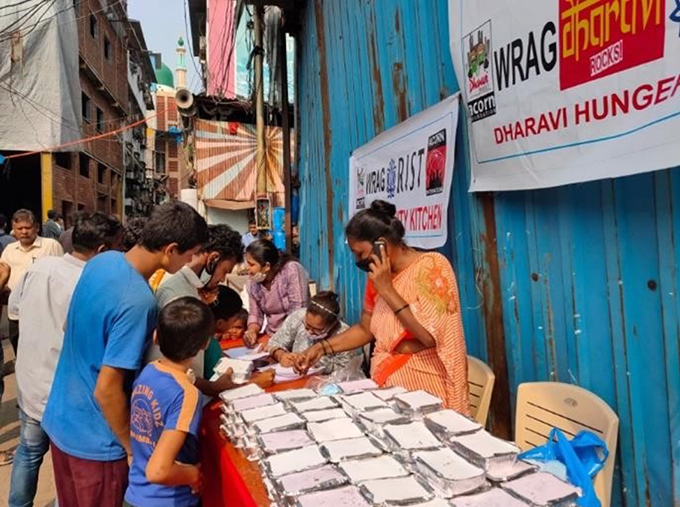
slums or are an informal worker in Delhi, Bengaluru, or Chennai, you are one of 50,000 ACORN members fighting for basic survival and your livelihood through the organization on a daily basis. The same can be said as members wave the ACORN flag and wear the ACORN buttons in Kenya, Cameroon, Honduras, Peru, Liberia, Tunisia, and other countries, including the United States as well.
Lowering the Predatory and Unregulated Cost of Remittances
ACORN has come together in campaigns that join our members across countries. One example is lowering the predatory and unregulated cost of remittances from North America and Europe to the countries in the Global South where we organize and have members, and have fought with actions and engaged in negotiations with MoneyGram (based in Dallas) and Western Union (based in Colorado). Campaigns against private equity housing REITs have linked ACORN affiliates in Ireland and Canada in actions and campaigns. Organizing originally in India to protect the livelihoods of hawkers, street vendors and others in India against the expansion of big box retailers like Walmart, Carrefour, Tesco, Metro and others found ACORN fighting continually against the expansion of foreign direct investment modifications in multi-brand retail, where in our India FDI Watch coalition, we both delayed adverse impacts and won significant restrictions to any expansion, while working with labor union partners in North America and Europe.
The Strength and Resilience of Community
ACORN’s strength as a grassroots membership-based organization was tested by the crisis of Hurricane Katrina in New Orleans in 2005 where we had 9000 members and our headquarters. That crisis proved the strength of our resilience and the value of a national community organization that could rally and respond to existential crisis effectively. The COVID-19 pandemic played a similar role in the growth and development of the multinational organization. In crisis, the members had to find support, and they found it together in collective response. Members stepped forward to help each other get groceries, make pharmacy visits, fight evictions, and more. Several thousand members volunteered for mutual aid in England alone in the first months of the pandemic. Membership growth soared across the organization, even though the door-to-door core of the ACORN organizing model was impossible for months, just as it had been in Katrina, recording record growth in France and Canada, and a doubling of the membership in England, Wales, Scotland, and India. This was not a campaign any of our members, leaders, or organizers wanted or designed, but in classic organizing fashion confronting the situation once again proved the ability of the organization to adapt to crisis, meet our membership’s interests and issues fully, and by doing so grow in reputation, numbers, and power in response to the challenge.
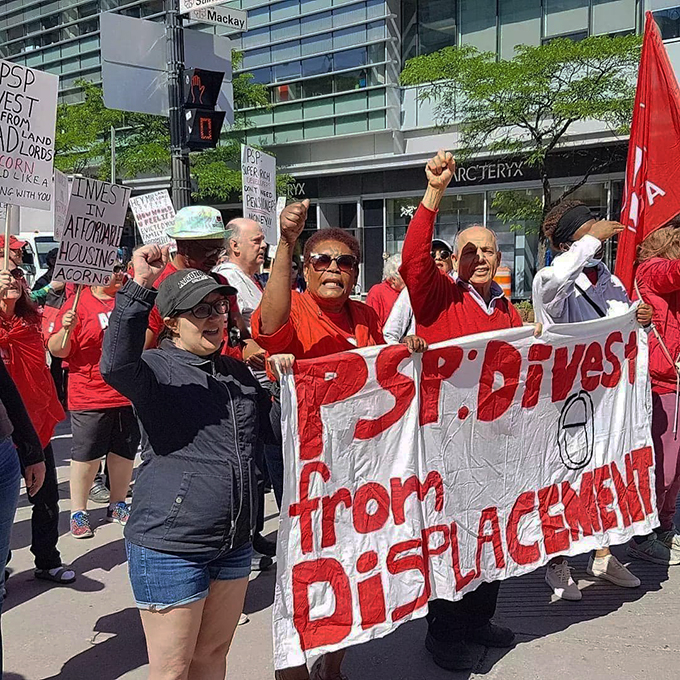
Currently, ACORN’s major international campaign on housing retrofits unites most of our countries around both their housing needs and their concerns about climate change and its terrible financial burden on our members. With victories and commitments already won in France mandating housing upgrades for housing units judged in the worst two categories, ACORN is now expanding the effort to upgrade housing along the same lines to prevent the loss of heat and lower energy costs throughout the United Kingdom and the European Union. ACORN in Canada has won some retrofit resources, though Ontario’s prime minister Ford vetoed some of our initiatives when he took office. The Biden administration’s recovery bill also included some need support for retrofits.
ACORN’s global reach continues in earnest though we struggle to keep up with the invitations and demands. We were on the brink of additional expansion as the pandemic intruded on fledgling efforts in Belgium and the Netherlands. Now, coupled with the retrofit campaign, the energy poverty provoked by the Russian invasion of the Ukraine, and the ongoing housing crisis, these initiatives have gained urgency with committees forming in Brussels, Liege (both in Belgium), Amsterdam, and Heerlen (both in Netherlands) that seem ready to mature in these two countries in 2023, with Germany likely in 2024 as part of the “just transitions” program. Early work has also begun in Melbourne, Australia, and Wellington, New Zealand, as the organization’s work and reputation continues to spread and provoke interest.
In the United States
Of course, in the United States, ACORN is both the same and different. Different in the sense that after the video scam and coordinated rightwing attack on the organization in 2009, in 2010 the US organization reorganized from one centralized organization into independent statewide formations that reconstituted themselves. They sometimes coordinated but were mainly dedicated to local and statewide issues in the dozen of places where they survived in alternate formations with reconstituted the membership in California, New York, Texas and elsewhere. Founded and supported twenty years ago in response to demands from ACORN members who had immigrated to the USA but wanted the organization to make a contribution in their home countries, ACORN International continued to organize without interruption as a multinational federation carrying the torch and tradition forward.
ACORN is the same in the sense of still maintaining and developing many pieces of the longstanding, historic ACORN family of organizations with continuing direct community and labor organizing work among low-and-moderate families and workers. The ACORN headquarters remains in New Orleans, with our new building cattycorner to our old building, still at Elysian Fields and St. Claude Avenue, where the stoops face each other across the intersection. This location continues to be home to our Louisiana affiliate, A Community Voice, as well as Local 100, United Labor Unions(originally ULU and for 25 years part of SEIU) working in Arkansas, Louisiana and Texas with offices in Little Rock, Dallas, Houston, and Baton Rouge as well.
New Developments
There’s nothing like volunteer-run, member-supported community radio working as a megaphone for the dispossessed to speak truth to power and support progressive organizational forces for change
One new development can be seen from the street as you look up and see an antenna rising at the back of the building’s second floor, where the Affiliated Media Foundation Movement won an FCC license and built a low-power station, WAMF, which went on the air four years ago. WAMF joined 100,000-watt KABF in Little Rock, managed by AM/FM, KOCH that we co-manage in the Nairobi Korogocho megaslum, our internet membership station acornradio.org, and our newest internet license radioacorn.org in Uganda which is preparing to go on the air. Since we first went on the air with noncommercial radio in the early 1980s in Tampa, Little Rock, and Dallas, now by sharing software across the affiliated stations the New Orleans studio can assist in programming all of these stations. Our long-held dream of a “Voice of the People” network of stations devoted to giving a platform for low-and-moderate income families on-the-air achieved a breakthrough winning approval for the construction of seven full-power terrestrial stations (50,000 watts to 7500 watts) early in 2022. The one in southeastern Arkansas (KEUD in Eudora), once on the air, could link to the central Arkansas station’s coverage in Arkansas, as well as much of the Mississippi Delta counties and Greenville, where we also managed a station. The other licenses in development include: three in Colorado and three in New Mexico. Under the FCC rules, we have another two years to put all of them on the air, but that will depend on whether or not people understand the importance of organizing and giving voice to people in many of these strongholds of “red” America. There’s nothing like volunteer-run, member-supported community radio working as a megaphone for the dispossessed to speak truth to power and support progressive organizational forces for change, but sometimes we wonder if anyone other than conservative evangelicals continue to understand the tremendous power of the medium?
Research, Reporting, Reactions
Labor Neighbor Research & Training Center is also headquartered on St. Claude, where LNRTC publishes the quarterly journal, Social Policy, for academics, activists, organizers and other progressives, as well running Social Policy Press. Labor Neighbor also continues to house the Organizers’ Forum, as it has for the last twenty-years. Despite a pandemic hiatus, Organizers’ Forum is planning for a delegation to reprise our first international dialogue, by returning this fall to Brazil to evaluate the second act of Lula de Silva. We will meet with other progressive organizations to update our understanding and their experiences, since we were there on the eve of his first election. LNRTC also has joined with ACORN and Local 100 ULU, employing our “volunteer army” of interns from Tulane University, University of Ottawa, Denver University, and other institutions to jointly undertake and publish research reports valuable to our membership and undergirding our longstanding campaign commitments.
We have done several reports on healthcare in recent years, largely focused on the failure of tax-exempt, nonprofit hospitals to provide charity care, both as required in the special amendment to the Affordable Care Act (Obamacare) and their 501c3 status. Most of this work has been within Local 100’s organizational footprint of Arkansas, Louisiana, and Texas, where we have found that an additional billion dollars of free health care to lower income families could be made available by nonprofit hospitals if they simply hit the average, though inadequate, percentage nationally for charity at less than 4% of gross revenues. Recent work by the New York Times and Wall Street Journal has echoed our work and verified our conclusions. Hospitals need to either provide substantial free care or the IRS needs to withdraw their tax exemptions worth billions to them.
Another key joint report which has had significant, though not comprehensive impact, has been on diversity and governance in rural electric cooperatives through ACORN’s Rural Power Project. In 2016 and again in 2021, we reviewed IRS 990s for all of the co-ops in the twelve-state area of the South and found that in all of the states, regardless of the demographics, these ostensibly membership-run, democratically-elected bodies were governed inordinately by older, white men with women and minorities (often majorities) rarely having even 10% of the seats. There was only marginal change five years later. We have developed a mammoth organizing proposal to focus on these issues and the cooperatives resistance to alternative energy sources. Currently, we are making slow progress in list building and geo-mapping in preparation for a field, communication and organizing program in the South and West.
With a history of voter registration and electoral participation of our membership dating back to 1971, ACORN has been especially concerned about voter suppression efforts in recent years. Beginning in 2019, in partnership with the Ohio Voter Project, ACORN organized the Voter Purge Project (VPP) after achieving restoration of 40,000 voters to the rolls based on an error by the Ohio Secretary of State’s office. In the run-up to the 2020 election, we had acquired voter lists and regularly processed a dozen states to monitor purges, both routine and worse. We implemented a texting program to hundreds of thousands of voters in these states before the 2020 election alerting people that they had been purged, and linking them to re-registration, if appropriate. In the Atlanta area we put a team of 15 canvassers in the field to get voters out before the January 5th runoff in Georgia where purges had been a critical issue. In 2022, we entered a partnership with Catalist, the DC-based liberal data operation. The VPP has now processed more than thirty-five states on our way to building a voter database list that we can constantly renew and monitor for all fifty states.
Having built this kind of database operation in New Orleans, we are now doing tests on phone matches and texting programs from voter lists with phone numbers to areas where unorganized workers are concentrated. We are doing the same within the service areas of rural electric cooperatives in order to see if using these lists can spawn organizing opportunities among those interested and unorganized. ACORN and Local 100’s project the Workers Organizing Support Center, are implementing a test in central Florida to determine interest in organizing to gauge the viability of this movement moment. ACORN and WOSC have been supporting dollar store workers efforts to organize and win their rights with these low-wage companies in that area, as well as in metro-Atlanta. We have a joint project with Georgia State University to assess stores and their workers in the 170-dollar stores in the area. On the co-op front, we are implementing a similar test among members of rural electric cooperatives on the questions of alternative energy and current utility pricing, to gauge the interest in governance changes from the membership base in Arkansas and North Carolina.
The Future
In addition to the rebranded old ACORN affiliates, there are activists around the United States looking to ACORN’s history and successes internationally, and domestically, as models for moving forward. In 2023, we’re taking our decades of shared lessons to create the ACORN Organizing School: a program that trains organizers in the elements of the ACORN model. In Memphis, Atlanta, Philadelphia, Boston and Baltimore, we’ll be preparing students, organizers, and activists to launch ACORN organizations of their own. As part of this effort, we’ve also launched ACORN Advocates. ACORN Advocates are monthly sustainers who meet quarterly with ACORN leaders to discuss opportunities and developments in our affiliates around the world. People want to organize here and around the world, so we are trying to scale up to meet the demand, and it takes a deep bench to sustain and grow the organization.
Using the time-tested and effective ACORN model in countries around the world, ACORN is still doing what it has always done: campaigning in the US for workers’ rights and concerted action, voting rights, cooperative diversity, governance to achieve alternative energy objectives, access to healthcare, building ground up community, tenant, and worker organizations.
It’s going on 53-years and we’ve changed with the times to meet the demands of our constituency and membership in different organizing environments. Every community, every city, ever state, province, and country are different, but lower-income and working families have issues. They want to build organizations wherever they live, to win power and make change against all obstacles.
This has always been ACORN ‘s mission, and it continues to be ACORN’s work. Support and join with us in this struggle!
…